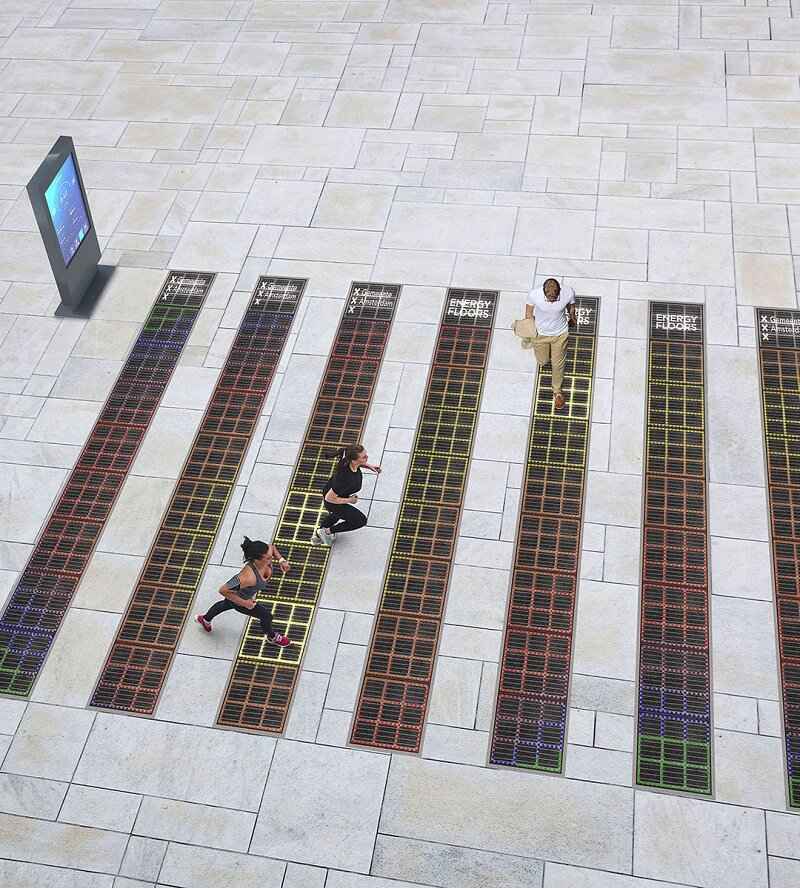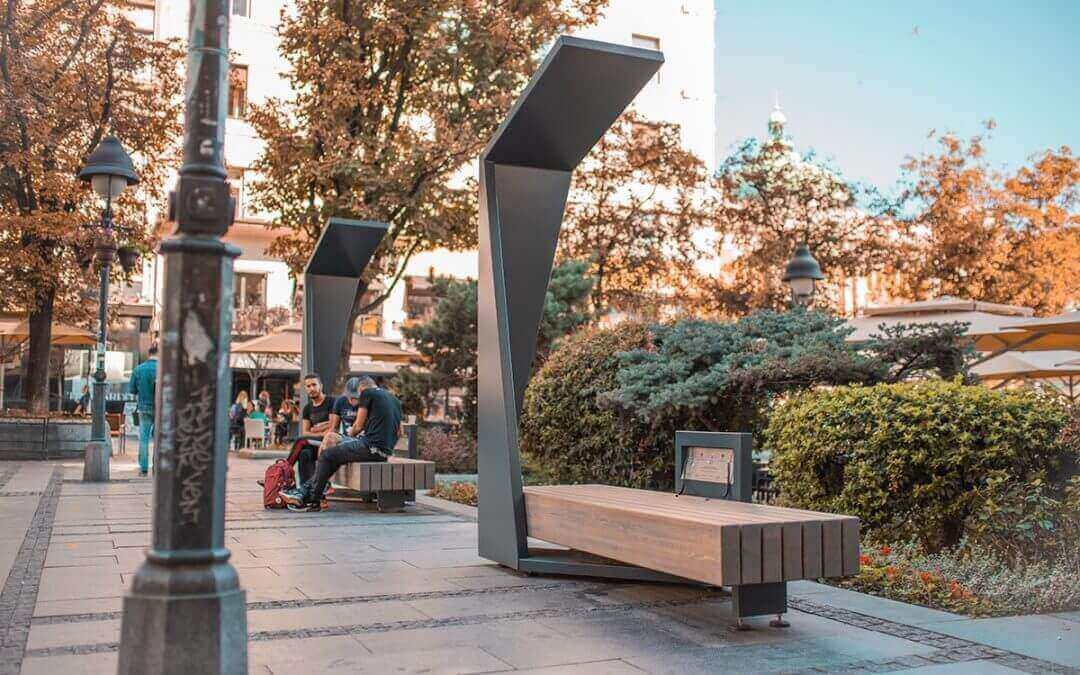Table of Contents
Deloitte’s 2022 report on global infrastructure trends shows how leaders and experts are increasingly focusing on smart city planning as the future, a future where the Internet of Things spreads out into every level of urban planning, creating more interactive, sustainable cities for all. Smart cities are the future of urban living. These smart cities are equipped with smart technologies to make life simpler, safer, and more convenient for residents. Smart street furniture is one of the most important elements of a smart city. In this blog post, we’ll discuss smart street furniture and how it helps build smart cities.
Building Eco-Friendly Cities
All of this can contribute to a sustainable urban lifestyle. In lieu of fossil-fuel-dependent electricity, smart street furniture will be powered by renewable energy through kinetic charging and solar power. Pre-set timetables, instead of static services, can be tailored to real-time events and needs. Combining cutting-edge technology, modern urban planning and the limitless potential of renewable energy, the developments in smart street furniture are real-world changes that are going to shape the future of our urban life.
What Can Become Smart Street Furniture?
Urban planners envision a digital future— a future where the internet has interconnected and optimised throughout our daily life. It’s not about a radical facelift of public space, it’s about leveraging what is already available. Picture a city where bus stops provide solar-powered free Wi-Fi and are connected to traffic updates, where the humble park bench charges electronics and provides real-time environmental information, while citizens enjoy their lunch break.
Outdoor furniture that includes technology like sensors, Wi-Fi, charging connections and other features is called “smart street furniture.” Bus stations with real-time information displays, seats with built-in charging outlets, and garbage cans that signal maintenance personnel when they need emptying are some examples of smart street furniture. These types of furniture offer new services that make life easier for citizens in addition to their traditional uses.
Smart outdoor furniture is crucial to the development of smart cities. Benches, street lighting, bike racks, and even garbage cans are examples of smart outdoor furniture that can be fitted with sensors to gather information about the local environment, traffic patterns, and citizen behaviour. The quality of life can be increased using this data to optimise city services. For instance, sensor-equipped street lighting can change its brightness in accordance with the amount of light, conserving energy and lowering light pollution.
In summary, smart street furniture is an essential part of smart cities. Making new services available and gathering crucial data contribute to making cities safer, more practical, and more sustainable for residents. As technology develops, future smart street furniture will likely take even more avant-garde shapes. With the incorporation of smart street furniture, the creation of tomorrow’s smart cities has become one step closer.
Smart Solar Benches
Smart Solar benches are an excellent illustration of the versatile uses for smart street furniture that will improve the aesthetics and sustainability of urban areas. These Smart benches can generate sustainable energy while simultaneously offering sitting, charging, and Wifi connectivity, thanks to the incorporation of energy-generating technologies.
Smart seats at bus stations can be fitted with solar panels. To pass the time while you wait for the bus or while hanging around a shopping centre, people can charge their devices from the USB or wireless charging ports on these benches. In addition to the charging ports, these benches have WiFi connectivity & environmental sensors built-in. Working with innovative technology & green energy shows the city’s dedication to sustainability.
The same applies to parks. Parks are more than just a place to relax and enjoy nature. They’re also an integral part of our community and deserve the latest smart technology. Smart parks are equipped with features like real-time occupancy tracking, efficient lighting systems, smart solar benches and sustainable waste management solutions, making them safer, more eco-friendly, and overall, better places for everyone to enjoy.
Cities may gather crucial data with the help of smart benches. The smart benches collect data on usage patterns and environmental conditions. This information may help improve parks and bus stop services, becoming more alluring, effective, and secure for the community
In conclusion, smart solar benches at bus stops and parks are an excellent illustration of how smart street furniture may perform various functions and raise a city’s general standard of living. They can improve the aesthetics, sustainability, and utility of residents in urban places by offering a place to sit, charge their devices, free wifi and important data about the local environment.
Solar Tiles
Integrating energy-generating solar tiles into city infrastructure is one strategy cities may use to improve their sustainability and efficiency. These tiles are suitable for usage in a range of public areas, including parks, shopping centres and sidewalks, and they can produce renewable energy from both the sun & the movement of people.

The energy produced from both the solar panels & from people moving over the tiles may be stored and utilised to run street lighting, signs, charge electric vehicles/e-bikes and other infrastructure. This lessens the city’s carbon footprint and offers a clean energy source that might make the city more sustainable.
Solar tiles offer a distinctive method to enhance the appeal and interaction of public places and produce sustainable energy. The illumination of the tiles allows them to change colour or pattern in response to the motion of people. This can provide a vibrant, appealing, sustainable, and interesting public area. Cities may go one step closer to becoming smart cities by integrating energy-generating solar tiles into their infrastructure. These tiles show the city’s dedication to sustainability and innovation and serve as a source of clean energy. Additionally, they can offer vital information that can be utilised to streamline city operations and raise residents’ living standards in general.
In summary, energy-producing solar tiles are an important part of smart cities. They may contribute to cities becoming more sustainable, effective, and liveable for residents by producing renewable energy, enhancing the appeal and interactivity of public places, and delivering crucial data.
Check Out: Green Energy Innovations in Parks & Open Spaces
Let’s Build a Smart City with Eco-Renewable Energy
Are you prepared to transform your city into a smart city and take it to the next level? Then, it’s time to invest in Smart street furniture. It will enhance your community’s quality of life and show your dedication to sustainability, innovation, and the future of your city. You can build a more sustainable and effective city by integrating energy-generating technologies, smart benches, and Solar tiles into your infrastructure. Additionally, you can get crucial information that will help you enhance city services and decide how best to move your city forwards. Take action now and start planning for a smarter and more livable city. Contact us today to learn how smart street furniture can benefit your city and take the first step towards creating a smart city.


Recent Comments